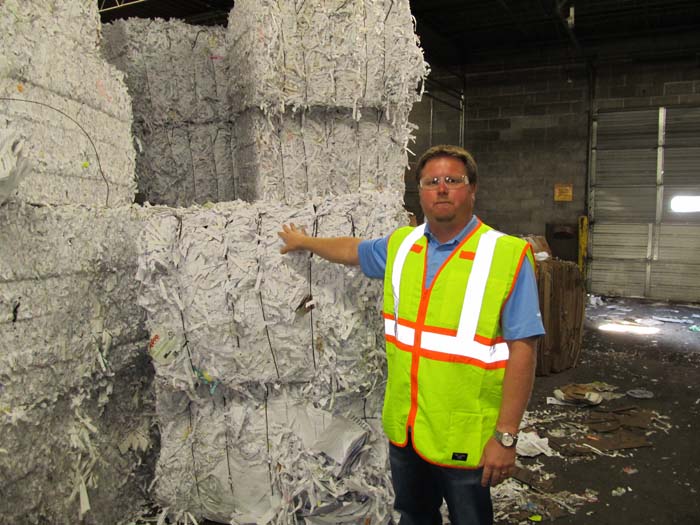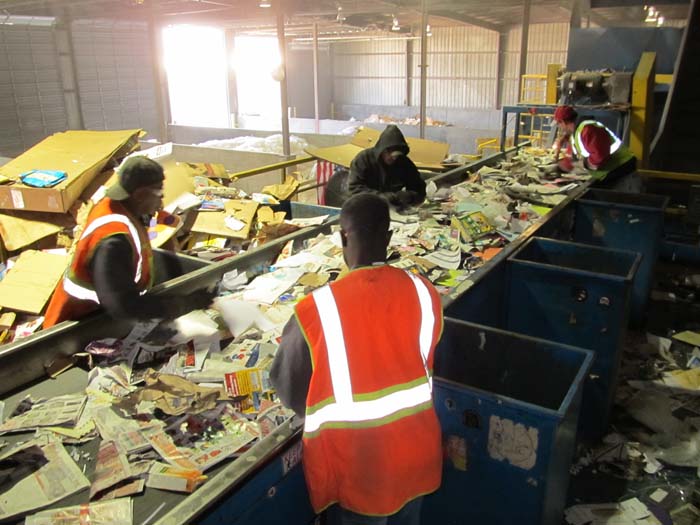
Their Lincoln area neighbors can breathe easier, drink cleaner water and enjoy savings on their energy bills thanks to their hard work.
But Midlands Recycling is too busy to take credit for a cleaner capital city in the Cornhusker State. In 2011 alone, the company sorted and bailed 14,400 tons of paper material, recycling efforts which saved more than 100,000 trees and enough water to supply almost 700 families for a year. They also saved more than 47,000 cubic yards of landfill, which has helped the city extend the capacity of its current landfill beyond its 25-year lifespan.
Midlands Recycling, just south of Lincoln’s historic Haymarket District, was purchased by Palmer and Sons, a family-owned firm in the refuse business for more than a quarter-century. Palmer had rented the operation over the previous year or so before they used the proceeds from an SBA 504 loan approved Sept. 2010 with the help of the Nebraska Economic Development Corp. (NEDCO) and Farmers & Merchants Bank to purchase outright the 45,000-square foot facility; since they took over in May 2009 in the teeth of the recession they've doubled the company's revenues. Another SBA loan approved December 2011 offered the business a line of credit.
“When we got into the market, the business went through a crash and only slowly rebounded,” said Executive Vice President Micah Palmer (pictured above with stacked bales of shredded paper).
But that’s wasn’t the worst part. As Palmer and his family first took over the recycling facility, they found “a disaster,” he said. More than 3,000 tons of trash was stacked five bales high all over the property, and 32 semi-trucks were left loaded with even more bales. So for the first four months, they spent long days, often from 3 a.m. to 8 p.m., just cleaning out the stuff left behind.
The family overcame that early start and the business since has grown from seven to 19 employees. Micah’s brother Kelsey runs Midlands Recycling, while another brother, Colby, runs the family’s Palmer and Sons Refuse business. Their mother also works for the company.
“I pretty much work 50-60 hours a week and even though I’ve been running the plant for three years now, and I’m still learning. But with two young kids and wife, I’m always looking for that balance,” Palmer added. “We strive to keep our guys to 40 hours a week, because we’ve found any more than that and productivity suffers.”

Workers at Midlands Recycling sort trash on a conveyor belt.
And make no mistake, it’s tough work, especially for the employees standing long hours at a conveyor belt wearing thick gloves up to their forearms sorting out glass, cans and plastic from cardboard and paper to be bailed and trucked to an area processing plant. Those bales of plastic can be interesting; a dramatic change in temperature, such as the Lincoln area saw this spring, and they can expand and burst, creating a fresh mess.
The company has provided their small business customers across Lincoln and nearby Omaha with 200 recycling bins, collecting more than 30 tons of cardboard per week, much of which eventually becomes manila folders, new boxes, insulation and product packaging.
"If you've bought a case of Corona or Dos Equis beer, the cardboard came from here in Lincoln," Palmer said with a smile.
Palmer added the glass bottles they collect are turned into countertops, and plastic becomes playground slides and castles for kids; cans go off to Anheuser-Busch to be re-used. They even recycle the heavy wooden pallets used to move bales on to the trucks; Midlands Recycling sends those over to another Lincoln small business, Arbor Industries, to be made into new pallets.
He said the company also collects grass clippings, leaves and other yard waste stuffed in 96-gallon toters from about 500 residential curbside customers, which the company turns over to an organic farmer in the area for use as a natural fertilizer. Recycling this yard waste alone has saved 21 percent of landfill space.
That’s important for a city and surrounding Lancaster County which went through a battle in the 1980s to put a landfill at its present site, “something nobody wants to go through again,” said Mike Palmer, the family patriarch and owner of Palmer and Sons. There hasn’t been another landfill site in the area since, so extending the expected 25-year life of the present fill through recycling efforts has been crucial.
“Our customers wanted that service from us, and wanted an opportunity to slow the flow to the landfill,” the older Palmer added.
Another service their customers needed was solved when Palmer and Sons started Shredding Solutions in 2001 to handle the fast-growing demand to shred important documents, thwarting identity thieves, and recycling the remaining detritus.
“But shredders make paper messy and difficult to recycle,” Palmer said, pointing to the concrete floor of the Midlands Recycling facility, covered in tiny bits of trash.
.jpg)
Palmer shows the hands-on display in the Education Trailer.
Then there's the company’s effort to reach out to a younger generation, encouraging recycling by city school kids. Along with the Midlands Recycling business, Palmer and Sons got in their purchase a huge semi-trailer originally outfitted with a grant by the Nebraska Department of Environmental Quality stuffed with hands-on exhibits, video monitors and displays designed to teach kids the impact their actions have on the environment and the importance of recycling.
Students not only are educated to recycle, but the hope for Midlands Recycling “is that they'll grow up to be future customers.”
Midlands Recycling also invites local Boy Scout troops to tour the plant and learn the next step in their own community recycling efforts. They also work with Lincoln public schools to collect donated aluminum cans to purchase text books, and teamed with area recyclers on an effort to raise money for the school's general fund. The business also has sponsored a golfing event to help raise money for veteran scholarships.
The partnership Midlands Recycling has with Lincoln-based Journal Star Recycling, the first curbside program ever operated by a newspaper, improved collections by 25 percent and no small amount of landfill space alone. Thanks to a little help from the Nebraska Department of Environmental Quality, the company replaced 18-gallon containers with bigger 65- and 95-gallon carts to homeowners. The curbside carts are dumped into a truck using a machine arm, which can handle then hauled back to Midlands Recycling for bailing and processing.
"It's not that we feel we're saving the Earth here, what we do is beneficial, obviously," Palmer said. "People get wrapped up that recycling is a necessity, but there are some things that don't make sense economically to recycle. Styrofoam for example costs more and takes up more in resources to recycle than to manufacture because it's so easy and cheap to make. So recycling has to make sense as a business and it has to make sense for society.”
The National Restaurant Association reported in 2011 that 65 percent of restaurant operators have recycling programs in place, and that 60 percent of consumers prefer restaurants that recycle. In fact, more than half of diners say they would even pay more to eat at place with a recycling effort.
“There’s definitely a market for recycling,” Palmer added. “And it's a profitable business for us, too."
